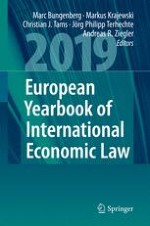2020 | OriginalPaper | Buchkapitel
Linkages of Trade, Investment and Labour in Preferential Trade Agreements: Between Untapped Potential and Structural Insufficiencies
verfasst von : Henner Gött
Erschienen in: European Yearbook of International Economic Law 2019
Verlag: Springer International Publishing
Aktivieren Sie unsere intelligente Suche, um passende Fachinhalte oder Patente zu finden.
Wählen Sie Textabschnitte aus um mit Künstlicher Intelligenz passenden Patente zu finden. powered by
Markieren Sie Textabschnitte, um KI-gestützt weitere passende Inhalte zu finden. powered by
